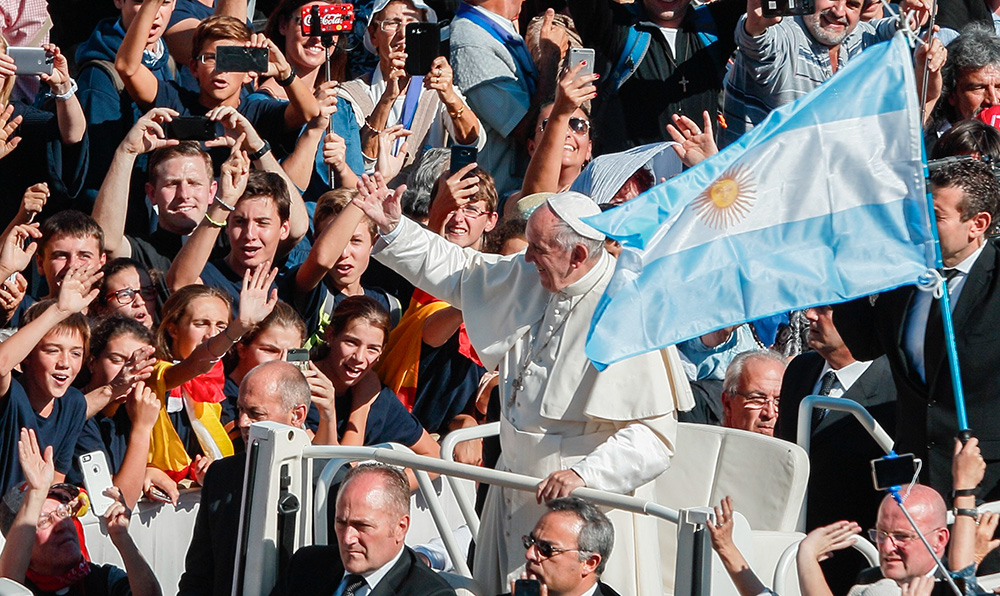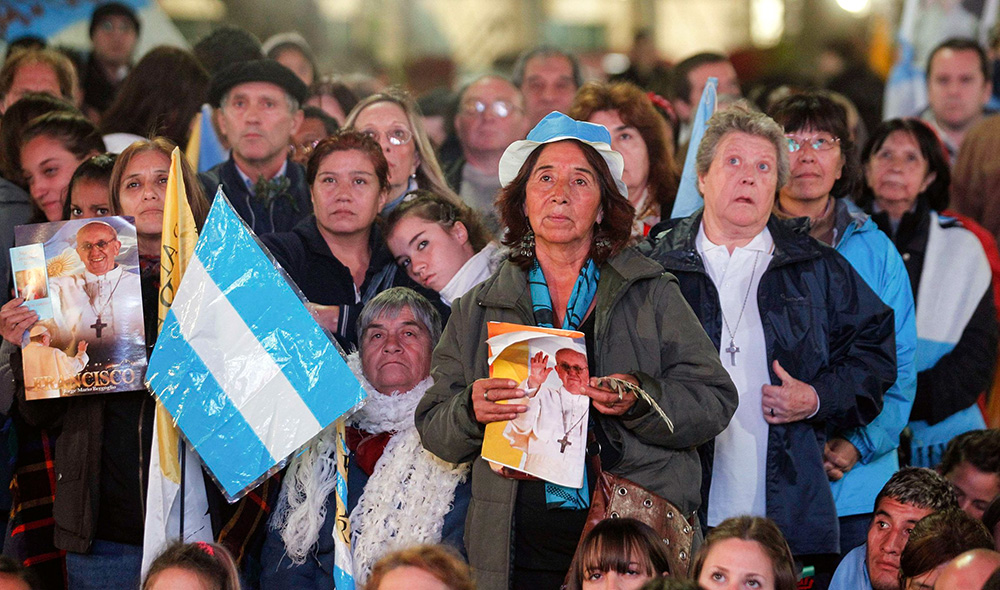
Argentina's flag is seen as Pope Francis greets the crowd after celebrating a canonization Mass for seven new saints in St. Peter's Square at the Vatican Oct. 16, 2016. Among those canonized was Argentine St. José Gabriel del Rosario Brochero, known as the "gaucho priest." (CNS/Paul Haring)
No sooner had Pope Francis died than the venting in Argentina began.
Argentines, miffed and hurt that he never returned to see them after he became pope, took their frustration out in national and international newspapers, on radio waves and television programs.
Sr. Susana Vanni wasn't one of them.
"There are people who truly are hurt because Francis didn't visit his native country," said Vanni, of the Sisters of Maria Bambina in Buenos Aires. "There are others who had a longing in their hearts, and I am one of them, longed that he would come to Argentina."
Vanni said she respects the pope's decision.
"It was clear to Francis that it wasn't the right time," she said.
The suspicion that he worried about being used politically is well-known, and Argentines need to keep in mind that he didn't want to deepen the country's polarization, Vanni said.
"We Argentines are very complicated," she said. "We politicized him. We threw him toward one side of the political aisle and the other. Some said he was of the right and others of the left. Some said he was in the center. ... We're complicated people."

People hold Argentine flags and images of Pope Francis as they watch the televised broadcast of the inaugural Mass of the pontiff on a giant screen outside of the Metropolitan Cathedral in Buenos Aires, Argentina, March 19, 2013. (CNS/Reuters/Marcos Brindicci)
To understand his decision, you also have to look at his formation as a Jesuit, she said.
"Francis was a person of discernment," Vanni said. "His formation was around that theme of discernment, the charism of [St.] Ignatius."
That process of making decisions guided by prayer and reflection likely led him to the conclusion that it wasn't the right time to visit home and that he had a host of issues worldwide to tend to, she said.
In a 2021 press conference on a flight from Iraq to Rome, he told people to stop fantasizing that he had "patriaphobia," a fear of the homeland, and explained that there had been a plan to visit Argentina in 2017 but it came apart for a variety of reasons, including legislative elections. He also explained his process for accepting invitations to visit a country: "I listen to advisers and in the end, I pray, I pray, I reflect a lot; I reflected a great deal on some journeys."
For Liliana Fernández, who often greeted him when she ran into him on the streets of Buenos Aires when he was Cardinal Jorge Bergoglio, it was clear that he loved and embodied Argentina even if he didn't return after he became pope. You could tell he felt at home when talking with Argentine reporters, Fernández told Global Sisters Report April 21.
"When he was informal, he had that Argentine sentiment," she said. "The way he talked, his memories, everything, it was very, very porteño," a term that describes with pride a person from the port city of Buenos Aires.
There had been talk, Fernández said, that this was going to be the year he would return. She said she watched a news report after his death about it, but something always got in the way.
"It was the pandemic, then we had political problems," she said. "He wanted them to pass — and then one thing and another — but I believe he always had wanted to return."
Looking at his final testament, written in 2022, it seems he had been feeling ill for a while, Vanni said. At around that time, Argentina also was getting ready for elections and, even without being in the country, the pope made headlines after one of the contenders, Javier Milei, now Argentina's president, called the pontiff a "representative of evil" and an "imbecile."
So, even if he'd wanted to return home after feeling that his life was coming to an end, Vanni said, timing and health seemed against it.
Advertisement
Francis' actions toward the people of his native country, however, should be taken into consideration to heal the woundedness some of them feel, she said.
"Francis made a great deal of gestures, to the world, but also to Argentina. He would call [by phone], he was present via video conferencing, he would call and ask about this situation and that situation," she said. "He was always close, asking others to inform him and Argentina was in his heart. I do believe he wanted to come but illness limited him in that last part [of his life]."
Argentines, however, always went to great lengths to see him wherever he was in the world, Fernández added.
"My children were with him in Brazil for World Youth Day, and they also went to Europe [to see him]," she said.
Her daughter and son-in-law visited him at the Vatican shortly after their wedding, received a blessing for newlyweds, had a photo taken with him and even shared mate — the national drink of Argentina — with the pontiff at the Vatican, she said.

María Guadalupe Baulos and Bruno Maltese, both of Buenos Aires, share mate, the national drink of Argentina, with Pope Francis after receiving a blessing for newlyweds at the Vatican April 29, 2015. Even though the pope never returned to Argentina, those from his home country always made the effort to go see him, said the bride's mother, Liliana Fernández. (Courtesy of Liliana Fernández)
Even though many throughout Argentina are deeply saddened, the pain after news of his death hit the bonaerenses, those from Buenos Aires, particularly hard, Fernández said, because he was one of them.
Fr. Alejandro Puiggari, who worked with the pope when he was the head of the Buenos Aires Archdiocese, in a video posted on Facebook said the news of his death took Argentines by surprise.
"The pilgrim of hope has finished his walk through this earth, leaving behind his example, his teachings," said Puiggari, visibly saddened.
Thousands flocked to the Basílica de San José de Flores in the neighborhood where he spent his childhood to hear the present archbishop of Buenos Aires, Jorge Ignacio García Cuerva.
Referencing the pope, García said in his April 21 homily that "the one whom we didn't always understand, but profoundly loved, is gone."
'The best homage we Argentines can pay to Francis is unity ... build bridges, engage in dialogue, and stop fighting all the time. If one is truly a father, what can be more painful than seeing his children divided?'
He pleaded with Argentines to honor Francis by becoming like him, by not excluding others, trying to be sisterly and brotherly even in the heavy air of divisiveness that invades the country. That would allow the pope to go to heaven in peace, he said.
"I believe the best homage we Argentines can pay to Francis is unity ... build bridges, engage in dialogue, and stop fighting all the time," he said. "If one is truly a father, what can be more painful than seeing his children divided?"
Even in death, some Argentines will go to him, including Milei, who plans to attend the funeral.
"In spite of differences that today seem minor, to have known him in his goodness and wisdom was a true honor for me," the Argentine president said via social media the day the pope died.
For those like Vanni, the pope's life away from Argentina, and his death in a distant land, didn't seem out of the ordinary, given what's expected of a person who chooses and is chosen for consecrated life, which sometimes involves leaving home.
"For me, he died the way many missionaries die in other places," she said: far from home.
Like Fernández, she said she was proud of the pope from Argentina who now is part of the history of the church. It took someone from Buenos Aires, which means fair or good winds in Spanish, to open the doors and the windows of the church and allow new air to flow, she said.
"It was perfect," she said, expressing hope that the wound some Argentines feel will heal in time and they realize what a gift the country offered, not just to the church, but humanity.
"Those of us who love Jesus, the church, the person who is pope, Francis as an Argentine, have to understand that even though we wished [for his return to Argentina], he had great motivations and we don't know what they were and we'll never know," she said. "But he wasn't going to do something without thinking about it. Personally, I am happy, happy, happy, with his 12 years [as pope]."





